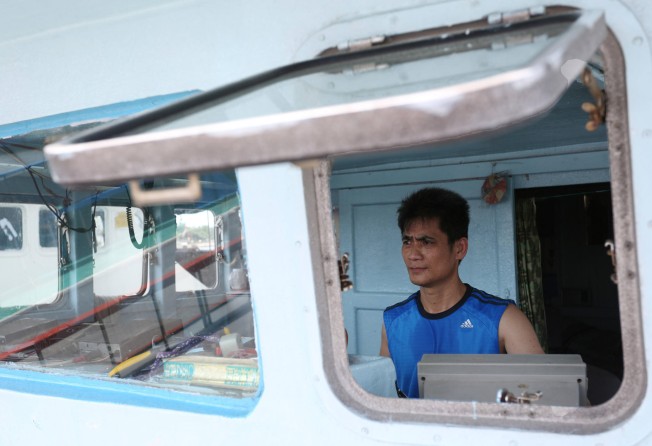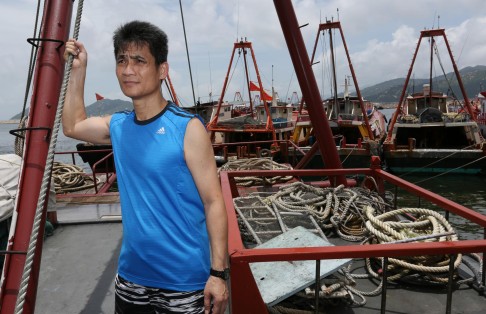
Fishing heritage may be the one that got away
Many local fishermen are struggling to survive in a changing industry, let alone preserve skills and traditions passed down for generations

It's a hot summer's day, and Lai Tai-sing is sitting on the deck of his fishing boat at the Cheung Chau typhoon shelter.

The Cheung Chau native learnt how to decode the hidden messages of the universe from his fisherman father. It is a vital survival skill for him when he goes fishing in the deep waters of the South China Sea. The weather, strength and direction of the wind, as well as the currents, lead him to the fish.
These weather and fishing skills and cultural rituals that are unique to generations of Hong Kong fishermen account for over 30 items on the government's intangible cultural heritage list published in June.
But they could well be on the way out. "It is a sunset industry. We are the last generation of fishermen," Lai says.
Watch: Meet Hong Kong's last generation of indigenous fishermen
Fishing was one of the city's big industries back in the 1960s, when there were about 10,000 boats in Hong Kong. But today there are fewer than 4,000 fishing boats, according to government figures.
More than 50,000 people were employed in the industry in 1970; in recent years that number has dwindled to less than 9,000.
The industry today generates HK$2.3 billion - a tiny proportion of the city's HK$2.02 trillion gross domestic product last year. It produces 155,000 tonnes of seafood - either captured or cultivated - every year.
Lai's family has been fishing in the South China Sea for generations. Originally from the Man Shan Islands in the Pearl River Delta, his great grandfather moved the family to Cheung Chau.
As a child, Lai spent a lot of time at sea, going on fishing trips with his family and learning the skills of the trade.
But these days, it's hard for fishermen to make a decent living in Hong Kong. Many are forced to take a break every year from June 1 to August 1 because of the annual two-month fishing moratorium that has been imposed since 1999.
During this period, all fishing is suspended in the South China Sea, except for gillnetting, longlining, handlining and cage-trapping, in order to conserve the seabed to create a sustainable fishing industry.
Around 1,400 vessels are affected, and Lai's is one of them. He isn't sitting on the deck of his boat in the typhoon shelter because he wants to catch some rays.
"I have no salary for these two months. I have to live on my savings," says Lai, who usually makes about HK$10,000 to HK$20,000 a month.
A trawling ban was also introduced last year, in the name of conservation, which forced out fishermen using that method.
But some locals in the industry have said pollution and the actions of mainland fishermen - some of whom are accused of electrocuting or even poisoning fish - are doing the real damage.
And Lai says it is impossible for Hong Kong fishermen to compete with those from the mainland.
"The harvest is bad, but they still get government assistance, such as the fuel subsidies. If you've got a mainland licence, you get the subsidies."
For some local fishermen, all the new rules and restrictions have made life at sea unsustainable. Many have given up on the industry.
A few years ago, Lai's childhood friend Cheng Yau-fok sold his boat, which he had taken as far as Taiwan and even South Korea. He had been fishing for 30 years, spending up to four months of the year at sea.
"The income is very unstable. Fishermen are very practical. We just want to make a living," Cheng says.
Some fishermen now work from small boats and fish near the shore with gill nets, he adds.
Both Lai and Cheng say their children are not interested in carrying on the family business and lead very different lives on dry land.
For those still fishing, many of the traditional skills are starting to disappear. Radar and weather reports have replaced the need for weather and observation skills, Lai says.
Others, such as the fishermen's dialect and the fishermen's laments - songs sung at weddings and funerals - are already lost. "We just don't speak [the dialect] and we don't know the songs," Lai says.
Although Lai and Cheng agree that the cultural heritage of the city's fishermen should be preserved, they worry for the future of the industry.
"When there's no one still in business, what's the point of keeping these traditions?" Lai asks.
